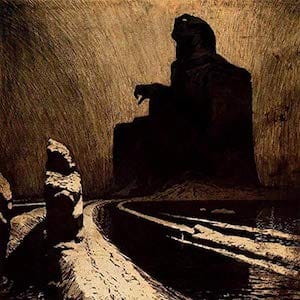 Provincials – The Dark Ages
Provincials – The Dark Ages
Sacred Geometry – 15 November 2019
Winchester (Hampshire)-based Provincials are something of an enigma. Their nucleus is the duo of singer Polly Perry (formerly of vintage/retro combo Polly & The Billets Doux) and guitarist/author Seb Hunter, and The Dark Ages, their second full-length album, follows a gap of four years since their 2014 debut Muhzik, this gap having been plugged only by a couple of EPs (2014’s When The Light Changes and 2015’s Ascending Summer), since the release of which they temporarily “lost” third member Steve Gibson (and although Steve has now returned to the lineup, he doesn’t appear on The Dark Ages).
Provincials’ stock-in-trade is a striking, and quite individual brand of contemporary-retro dark-folk, with a sense of central vision that nevertheless isn’t readily definable. Some – but not all – of The Dark Ages’ songs happen to be about drowning, but that may just be a coincidence!
As a basic rule-of-thumb, Seb writes the music and Polly the lyrics; Polly does most of the singing, Seb helps out with occasional, reluctant (if unfairly self-deprecating) vocals. Seb’s clearly a very skilled guitarist, and he displays considerable inventiveness in multi-tracking and other effects while retaining a significant musicality of expression. In that respect alone, Polly‘s choice of accompanying instrument is most ingenious – a theremin (a moog theremini) which sounds nothing like the ethereal spacey “traditional” theremin, but instead is used to create complementary atmospheres, textural washes and delay-effects (although Seb laconically terms it “a super versatile machine of mayhem and sonic destruction”!). The Provincials’ soundworld thus casts a real spell; a majority of the album’s ten songs centre around limpid, precise, manipulated guitar tones, with dramatic enhancement from the theremin. This is perfectly encapsulated by I Can’t Sleep, which marries a Jansch-style intricacy of riffing with Seb’s moody, fractured part-scat vocal. In direct contrast, we then encounter self-styled “Spanish revenge ballad” The Empire Line, where Seb’s florid flamenco-style guitar wizardry ushers in and supports Polly’s delicately poised melody line and memorable lyric – a standout track methinks. Another intriguing, but very different track is the attention-grabbing album opener, March Of The Ocean, described as a “mash-up” of Scottish poet John Davidson’s creation In Romney Marsh where he foretells his own death (suicide by drowning). This track finds Polly intoning against an unsettling wave-like theremin wash and some suitably hefty guitar adventurings.
The extraordinary We Lost Our Minds is an eerie, disorientating waltz-time number that drifts in through an ether fog as “the sound of shell-shocked insanity manifest”, sung from the perspective of a First World War nurse in a convalescent hospital. Equally strange and distinctive is the trance, drone-driven penultimate track The Western Shore, another stark and amazingly close-knit performance from Polly and Seb, from the lyric of which stems the disc’s title. The album’s final track, The Same Sigh, evokes an almost resigned state of weary exhaustion via a not-entirely-deliberate out-of-temporal-focus quality to the playing and singing. On the song’s appended coda, album producer Dan Parkinson helpfully contributes a degree of piano embellishment, in something of a Romantic-inclined style that reminded me a bit of John Hawken’s playing in the early incarnation of Renaissance. Dan’s piano also introduces and punctuates the softer sensuality of Lay On Me.
The album also contains three wild-card moments. The weirdest of these by far (spoiler alert!) occurs towards the close of Skara Brae, where a rippling, starkly delivered “analogy for ancient love or love that feels ancient” abruptly disintegrates into distorted, indecipherable vocal cacophony. Quite deliberately too, as it turns out, and arguably even more puzzling than the song’s complete avoidance of any specific geographical allusion to its title location. There’s an accompanying video for this song (which premiered on Folk Radio here), which may provide clues; therein, a pastoral scenario becomes suddenly displaced, submerged amidst a welter of splashing distortion and images of warped guitars and yes, drowning (it’s that Ophelia again!).
The second wild-card moment occurs with mid-album track Inkerman, where you could almost be listening to a different band, a thrusting alt-indie-rock outfit with distorted electric guitar to the fore and a pounding drumbeat (that’s Dan there at the kit). Polly also “comes over very Jex Thoth” (yeah!), while a similar feel to alternate sections of Cat’s Cradle brings a satisfying contrast and change of perspective through the song’s slightly-less-wild-card structure.
On the subject of wild-cards, I’d love to hear the track that didn’t make the final cut, which Seb enticingly and graphically describes as “a full-on bonkers rawk blow-out called One-Armed Swordsman where I go totally Black Francis/Kurt Cobain bug-eyed crazy”. Apparently Seb and Polly were persuaded that it might scare people off! Personally I tend to disagree, for the occasional almost wilful unpredictability of Provincials’ music, much in spite of its consistencies of conviction and execution, is but one of its many attractions, tellingly complementing Seb and Polly’s unique combined creative forces.
Read their Track by Track feature on Folk Radio UK.
Order the album via Bandcamp: https://provincials.bandcamp.com/
